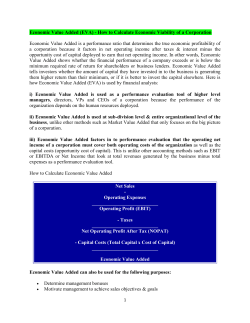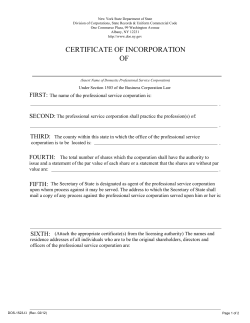
Guide 8 How to Conduct an Annual General Meeting (“AGM”)
Province of British Columbia Guide 8: How to Conduct an Annual General Meeting Guide 8 How to Conduct an Annual General Meeting (“AGM”) IMPORTANT NOTICE This guide was prepared by the Superintendent of Real Estate and updated by the Ministry of Housing and Social Development. This guide, along with other guides in the series, provides basic information about certain parts of the British Columbia Strata Property Act (the “Act”) and its Regulations. Readers cannot rely on the guides for legal advice The guides do not: • provide a legal interpretation of provisions of the Act or Regulations. Please consult the Act and Regulations and court judgments to determine the complete and precise requirements of the legislation. • include information about how the courts may have interpreted provisions of the Act or Regulations. Readers should seek professional advice if they need to determine specific legal rights and duties which may apply in their particular situations. The Province of British Columbia may periodically update the guides. Nevertheless, neither the Superintendent of Real Estate, nor any other authority of the Province of British Columbia, is liable for any inaccurate or incomplete information in any guide. For the convenience of readers, updated information has been flagged in bold italic in the guides and will remain marked this way for approximately one year from their noted revision dates. In addition, the Standard Bylaws referred to in the guide do not necessarily apply to every strata corporation. Strata corporation bylaws can be enacted, amended or repealed by the developer or the strata corporation. Please conduct a search at the Land Title Office to obtain a copy of all filed bylaws and bylaw amendments for a specific strata corporation to determine which bylaws are applicable. 1. Attending the General Meeting A strata corporation can create a bylaw which permits people to attend a meeting by electronic or other means, as long as the method of communication permits all persons to communicate with each other. Under the Standard Bylaws: • • • tenants or occupants, regardless whether they are eligible to vote, can attend the AGM; persons not eligible to vote can participate in discussions if permitted by the chair; and persons who are not eligible to vote may be required to leave the AGM if a resolution is passed by majority vote to exclude them. Updated: Friday May 28, 2010 at 1 pm Printed: 6 July 2010 9:28 AM Guide 8: Page 1 of 5 Province of British Columbia Guide 8: How to Conduct an Annual General Meeting 2. Taking Minutes Throughout the AGM, a person must: 3. • take minutes; and • record the results of all votes in the minutes. Determining if There is a Quorum Business can only be conducted at an AGM if there is a quorum of voters. Determining if there is a quorum of voters at the AGM requires following these steps: • review the strata corporation's bylaws to determine the number of voters needed to constitute a quorum. Under the Standard Bylaws, quorum is established when: - there are eligible voters present at the meeting either in person or by proxy who hold 1/3 the of strata corporation’s total votes; or - if there are fewer than four strata lots or four owners , there are eligible voters at the meeting in person or by proxy who hold 2/3 of the strata corporation’s total votes. • count the number of eligible voters at the meeting who are present in person or by proxy; • determine if the number of eligible voters at the AGM are sufficient to form a quorum; • unless the bylaws provide otherwise, if no quorum is present at the AGM within a ½ hour from its start, the AGM is automatically adjourned to the same day, time and place in the following week; • if the meeting is automatically adjourned due to a lack of quorum, and on the second meeting date, there is still no quorum present within one half hour from start of the meeting, then the eligible voters present in person or proxy constitute a quorum. Updated: Friday May 28, 2010 at 1 pm Printed: 6 July 2010 9:28 AM Guide 8: Page 2 of 5 Province of British Columbia Guide 8: How to Conduct an Annual General Meeting 4. Order of Business The Standard Bylaws provide that business at the AGM shall be conducted in the following order: • certify proxies and corporate representatives and issue voting cards; • determine whether there is a quorum; • elect a person to chair the meeting, if necessary; - 5. • meetings must be chaired by the president of the strata council; or if the president is unwilling or unable, then the vice-president of the strata council acts as chair; or - if neither president nor vice-president are willing or able to act as chair, then the eligible voters should elect a chair from amongst the persons present at the meeting. present to the meeting proof of the Notice of Meeting or the Waiver of Notice; • approve the agenda; • approve the minutes of the last annual or special general meeting; • deal with unfinished business; • receive reports of council activities and decisions since the previous annual general meeting, including reports of committees; • ratify any new rules made by the strata corporation; • report on insurance coverage; • approve the budget for the coming year; • deal with new business; • elect a strata council; and • terminate the meeting. Rules of Order Strata corporations who wish to use parliamentary rules of order to govern the conduct of general meetings may want to seek advice on how to incorporate rules of order with the bylaws, in compliance with the Strata Property Act. Rules of order include: Robert’s Rules of Order, Bourinot’s Rules of Order and MerriamWebster’s Rules of Order. Updated: Friday May 28, 2010 at 1 pm Printed: 6 July 2010 9:28 AM Guide 8: Page 3 of 5 Province of British Columbia Guide 8: How to Conduct an Annual General Meeting 6. How to Decide Matters on the Agenda Matters on the agenda are decided by a majority vote, unless the Act or Regulations require otherwise. The wording of a resolution requiring a ¾ vote as circulated with the Notice of Meeting can be amended only if such changes are not substantial and the changes are approved by a ¾ vote prior to the resolution being voted on. 7. Reconsideration of a ¾ Vote If a resolution requiring a ¾ vote was passed at a general meeting by persons holding less than 50% of the votes in the strata corporation, then the strata council cannot implement the resolution for one week unless such action is needed to ensure safety or prevent significant loss. Any ¾ vote passed by persons holding less than 50% of the votes must be retaken, if--within one week of the general meeting---persons holding 25% of the strata corporation's votes demand a special general meeting to reconsider the resolution. For example: • a strata corporation has persons who hold a total of 120 votes; • under the Standard Bylaws, in order to have a quorum, the strata corporation would need eligible voters holding a minimum of 40 votes (1/3 of 120 total votes) either in person or by proxy. In this example, 51 votes are present, more than the minimum of 40 votes required for a quorum. • The resolution needs to pass by ¾ vote. The ¾ vote is determined by those who vote for or against the resolution. It is not determined by the votes present, as abstentions are not counted. At this meeting a total 44 votes were cast; either for or against the resolution; with 33 votes in favour. The resolution passed by the required ¾ vote (33 out of 44). • However, the 33 votes in favour of the resolution are less than 50% or 60 of the total number of 120 votes. So the strata corporation must wait one week to implement the resolution because the resolution could be overturned. A vote must be retaken, if---within one week of the general meeting---persons holding at least 30 votes (i.e. 25% of the overall 120 votes in the strata corporation) demand a special general meeting to reconsider the resolution. Example of Reconsidering a Resolution Passed by a ¾ Vote Updated: Friday May 28, 2010 at 1 pm Printed: 6 July 2010 9:28 AM Guide 8: Page 4 of 5 Province of British Columbia Guide 8: How to Conduct an Annual General Meeting Total 50% # of of the votes strata in the corp’s strata votes Corp. 120 8. Quorum: # of votes # of votes # of votes 1/3 of total present in for or In favor of person or against the by proxy the resolution votes in the strata corporation 60 40 ¾ vote passed? 44 33 in favour hold less than 50% of strata corp’s votes? resolution 51 Did persons voting Yes, 33 out of 44 is 75 % 33 < 60 Votes Wait one Week Bylaws and the Second Annual General Meeting For a bare land strata, or an all-residential strata, no amendment may be made to the bylaws, before the second annual general meeting, without unanimous consent at an annual or special general meeting. At the second AGM and subsequently bylaws may be changed by the usual ¾ vote. References: Sections of the Act: 35, 48-51, 128, 154 Standard Bylaws: 25, 26, 28 Updated: Friday May 28, 2010 at 1 pm Printed: 6 July 2010 9:28 AM Guide 8: Page 5 of 5
© Copyright 2025
















